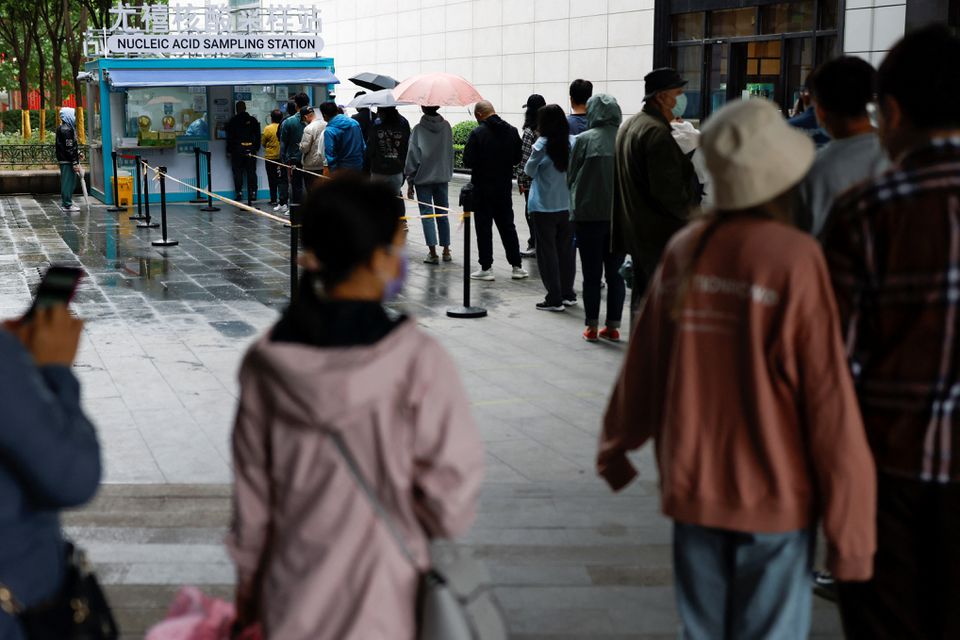
On Sunday, millions of Beijing residents waited in line for another round of COVID-19 tests, in what has become a daily habit as the Chinese city tries to contain a small but persistent epidemic – and avert a Shanghai-style extended lockdown.
Shanghai, which conducted 63 million PCR tests and 126 million fast antigen testing on its 25 million residents last week, will continue daily screening in the coming days, according to city officials.
In many Chinese cities, routine testing is destined to become a way of life, in the hopes of detecting and isolating diseases early enough to avert major closures and mobility restrictions.
COVID limitations in Beijing, Shanghai, and dozens of other major Chinese cities are having a psychological impact on the country’s citizens, pulling down the world’s second-largest economy and affecting global supply chains and international trade.
Beijing has shut down gyms and entertainment venues, restaurants have restricted dine-in services, and scores of bus routes and about 15% of its vast metro system have been shut down. Even the firms that remained open suffered losses.
Clients have stopped coming in because they don’t want to risk being classified as close contacts of COVID sufferers and being forced into quarantine.
‘They’re terrified of irregularities in their health applications,’ said a barber who only wanted to be recognised by his surname Song, referring to the mandatory mobile monitoring software for all residents.
‘There are malls and offices north of us that have been locked, and if they come, their apps might register them as close connections.’
Song stated that his salon will attempt to remain open as long as possible, although he did not specify how long. ‘Everyone has been shaken by this pandemic.’
Premier Li Keqiang committed on Saturday, in a teleconference with other top officials, to support ‘as many employers as can,’ particularly small and medium businesses, in order to keep people employed, according to state news agency Xinhua.
In March, China’s unemployment rate hit 5.8%, the highest since May 2020, with a record 6.0 percent in 31 large cities. The job market has been further hammered since April’s full lockdown of Shanghai and further restrictions elsewhere.
Instead of living with COVID like most other countries, which are reducing or abandoning antiviral precautions, Chinese officials are firm in their determination to eradicate the coronavirus. The authorities threatened critics of the zero-COVID policy with legal punishment last week.
Most people in Shanghai had been confined to their housing compounds for more than a month due to China’s largest ever outbreak. Many people say they can’t buy food or seek emergency medical care or other basic services.
Parts of Shanghai have had their risk levels officially reduced to the point where they might theoretically leave their homes under government standards.
While some were permitted out for short walks or grocery runs, the majority were still confined to their complexes, sparking widespread discontent and sometimes violence.
Last week, videos surfaced online showing scores of Quanta employees overwhelming hazmat-suited security guards and vaulting over plant gates to avoid being stuck inside amid COVID rumours.
Beijing was keen to avoid a public outcry, so it worked nonstop to track and isolate diseases.
Residents in the Chaoyang, Fangshan, and Fengtai districts, as well as minor areas of other districts, lined up for another round of tests on Sunday. Two persons strolled through a vast Chaoyang property with loud speakers blasting a constant message telling inhabitants to get examined.
Many residents must produce a recent negative result to get to work or visit other locations, even if they were not subject to the mass tests.
Daily COVID cases in Beijing are in the dozens, far lower than in Shanghai at this stage of the outbreak, when infections were in the triple digits and climbing.
The number of cases in Shanghai reduced for the ninth day on Sunday, but remained in the thousands.
Shanghai, like other Chinese cities, is constructing hundreds of permanent PCR testing sites. With the majority of citizens remaining inside, this appears to signal a gradual return to normalcy as people return to the streets.
However, authorities have warned that this is still a long way off.
Top Chinese leaders met last week and pledged to resist any speech or action that misrepresented, questioned, or rejected the country’s COVID policy. Officials from the Shanghai Communist Party and the city government have also warned against complacency.

Post Your Comments